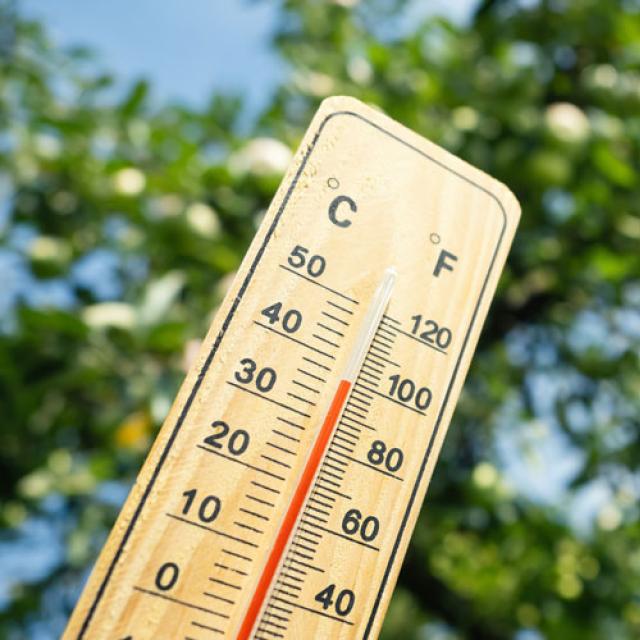Extreme heat: How to protect yourself

Global warming is a tangible phenomenon that is becoming increasingly apparent across the globe, and Québec is no exception. Summers are hotter and heat waves more frequent and intense, which has a significant impact on people’s health and well-being. To protect ourselves from heat waves and ensure our collective comfort, it’s essential to adopt preventive and protective measures when the heat hits the province.
To prepare for future heat waves, take a look at the following solutions for preventing the risks associated with extreme heat, and protect your family and community as best you can.
What is “extreme heat” in Québec?
Environment Canada issues a heat warning in Québec when one of the following conditions is expected to last for at least one hour:
- The temperature is 30°C or warmer and the humidex value is 40 or higher.
- The temperature is 40°C or warmer.
It’s important to note that the definition of “extreme heat” varies from region to region. In general, the temperature must be between 31°C and 33°C during the day and between 16°C and 20°C at night for three consecutive days.
Lastly, a “heat wave” is when extreme heat continues without providing any cooling relief at night.
Worrying statistics
Extreme heat poses real risks to the population. According to Government of Canada data, in 2010 (a year marked by intense heat in Québec), extreme heat was responsible for a significant increase of 33% in deaths (about 280 more) and 4% in emergency room admissions (about 3,400 more). With heat waves threatening to become more frequent, these statistics could change for the worse. What’s more, according to two scenarios put forward by the Ouranos innovation cluster, climate change could lead to an annual average temperature increase in Québec of 1.7 to 4.6°C in the south and 1.9 to 5.8°C in the north by 2050.
Who’s most vulnerable to extreme heat
Extreme heat affects everyone in one way or another. However, some people are more likely to have complications if exposed to heat. The Government of Québec identifies seniors, young children, people experiencing homelessness/loss of autonomy/chronic disease/serious mental health problems, pregnant women, those who are overweight and those who have a fever, as being at risk.
In addition, you can develop heat-related complications if you do intense physical exercise outside, don’t have access to cool or air-conditioned places, have a physically demanding job, or work in a place where processes emit heat.
Health risks of extreme heat
Extreme heat can have a serious impact on your health and that of your loved ones. The Québec government website lists a few symptoms to watch for that may be indicative of possible heatstroke:
- Headaches
- Muscle cramps
- Swollen hands, feet, and ankles
- Appearance of small red bumps on the skin (heat rash)
- Unusual fatigue or exhaustion
- Generalized malaise
- Signs of dehydration (intense thirst, less frequent need to urinate, dark urine, dry skin, abnormal skin colour, rapid pulse and breathing)
- Nausea or vomiting
- Sunburn
- Sunken eyes with dark rings
- Irritability or confusion
If you or a loved one experience any of these symptoms, watch for any subsequent deterioration in general health. Heatstroke is a medical emergency. Call 911 immediately if you’re caring for someone who has an elevated body temperature, is unconscious or disoriented, or has stopped sweating.
How to protect yourself from the effects of extreme heat
When the weather forecast predicts the mercury will climb above 30°C, it’s imperative to take the right steps to protect yourself from the heat. Here are some recommendations from the Government of Canada to address the harmful effects of extreme heat on your health and well-being:
- Prepare an emergency kit for your home.
- Stay tuned for weather forecasts and heat alerts.
- Drink plenty of water and avoid drinking alcohol.
- Find ways to stay cool (air conditioning, fan, keep curtains closed when it’s sunny, etc.).
- Fill up on cold drinks and take them with you when you go out.
- Take advantage of public water access points (swimming pools, lakes, splash pads, etc.).
- Apply sunscreen.
- Cool down by taking frequent lukewarm baths or cold showers.
- Wear a hat and lightweight, loose-fitting clothing.
- Stay in the shade and avoid exposure to the sun.
- Limit your use of household appliances and equipment that emits heat.
- Reduce physical exertion and exercise during the cooler parts of the day.
- Designate a contact person for support if you live alone.
By taking these small preventive steps, you can significantly reduce the effects of heat on your health and that of your loved ones. Lastly, no one is immune to extreme heat. If you feel particularly affected, feel free to ask a family member or neighbour for help and, if necessary, seek medical attention.
How to protect your community during a heat wave
Reducing the impact of heat waves on the overall population is critical to reducing the burden on the healthcare system and ensuring collective well-being. Here are some best practices to help your loved ones and community members cope with extreme heat:
- Maintain good relations with your neighbours, inviting them over for a swim and encouraging them to contact you when needed.
- Contact and visit loved ones frequently, especially those at risk of heat-related complications.
- Let a loved on who doesn’t have air conditioning stay with you.
- Monitor the health of more vulnerable neighbours, friends, and loved ones.
- Immediately escort people with alarming symptoms to a safe place or the emergency room.
We’re THERE to ensure your collective well-being!
At Promutuel Insurance, your coverage has been our priority for over 170 years. By caring about others and adopting these preventive measures, you and your loved ones will be better equipped to face the challenges posed by extreme heat and heat waves, which are becoming more frequent in Québec.
Follow us on social media and share our tips to help raise community awareness of extreme heat issues!



